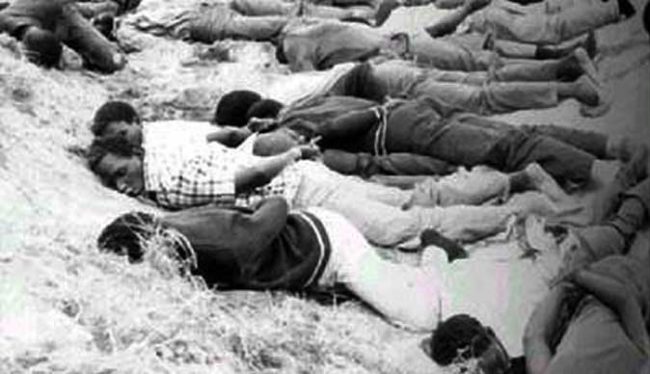Source: Gukurahundi victims recount horror | The Standard
BY SILAS NKALA
THIRTY-three years after the army pulled out its North Korean-trained crack unit blamed for post-independence atrocities in Matabeleland and Midlands, some Gukurahundi victims say there are still traumatised.
At Dakiwe, a village in Lupane’s ward 15, some women said they are reminded every day of their ordeals of being raped by soldiers from the Fifth Brigade as they conceived children, who do not know their fathers.
The women spoke at a meeting organised by the Rural Community Empowerment Trust (Rucet) and the Centre for Innovation Technology (Cite) on Friday in the Matabeleland North district, which bore the brunt of the army pogrom commonly known as Gukurahundi.
A woman, originally from Lubimbi in neighbouring Binga district, said she was 17 years old when she was raped by a soldier in 1983.
The woman said she was at school one day when a soldier picked her out from other children and sent her to the shops to buy a soft drink.
When she returned, the soldier ordered her into a pit close by and raped her, leaving her for dead.
She was only rescued the following day by a search party after her schoolmates noticed that she had gone missing.
The woman said she was taken alongside other youths to bases for Fifth Brigade soldiers in Lupane and Siwale.
During that time she says she saw several men being killed and buried in shallow graves.
A month later, she fell ill and it was discovered that she was pregnant.
“I got pregnant in 1983 after being raped,” she said shedding tears.
“I gave birth on January 25, 1984 and I do not know my daughter’s surname because I was raped.”
The woman said the incident was haunting her daughter because prophets told her she would not conceive until she finds her father.
“This pains me a lot,” the woman added. “At the moment she is in Botswana.
“She has even been divorced because she cannot conceive.
“Who will heal me of this pain?
“Gukurahundi ruined my life.
“I was raped in a pit and I do not know the surname or name of the man, who made me pregnant.”
A 55-year-old woman told the meeting she gave birth in 1983 after being raped by a soldier while she was still a schoolgirl in Gomoza.
She said soldiers would take them to their bases where they would be made to sing the whole night. They were also repeatedly raped.
After Gukurahundi, the woman said she was stigmatised by other villagers, who referred to her as a prostitute for sleeping with the soldiers.
“The man, who impregnated me was discouraged from marrying me by his parents, who said I was a prostitute that slept with soldiers,” she narrated.
Besides the sexual abuse, the woman said her family was traumatised by the abduction of her uncle, whose whereabouts remain unknown 33 years after the atrocities ended.
Several other women told stories of how they were struggling to obtain identity documents for their children, who were conceived following the sexual abuse by the Fifth Brigade soldiers.
Vumani Ndlovu, the Rucet coordinator, said the Friday meeting that was attended by the National Peace and Reconciliation Commission (NPRC), was an eye opener.
Ndlovu said the victims were clear that they wanted truth-telling as one of the ways to bring closure as far as Gukurahundi was concerned.
“We hope and trust that the NPRC will help you take the issues up to the president since you are asking for him to explain the reasons behind the killings,” Ndlovu told the meeting.
Lesley Ncube, an NPRC commissioner, said the issues raised at the meeting would be forwarded to the commission’s chairperson Selo Nare.
“The commission is committed to go around the region hearing people’s concerns and experiences so as to ensure peace, reconciliation, reparations and compensation for the victims,” Ncube said.
According to a Catholic Commission for Justice and Peace report, at least 20 000 people were killed in Matabeleland and Midlands during the army campaign that was ostensibly launched to flush out dissidents.
Human rights activists, however, say the army campaign was meant to annihilate the Joshua Nkomo-led Zapu and targeted its civilian supporters.
President Emmerson Mnangagwa, who was State Security minister at the time, has so far refused to apologise for the atrocities.
Mnangagwa has been meeting civil society group from Matabeleland that are considered sympathetic to his government to address concerns of Gukurahundi victims.
The concerns include the reburials of thousands of victims whose bodies were dumped in shallow mass graves and the issuing of identity documents.

COMMENTS
Stop deploying shona police officers in Ndebele speaking areas. They traumatise us and remind us how gukurahundi forced a foreign language onto us. We need to deal with our trauma without the perpetrators reminding us of our defeat by imposing their language on our communities.
I am crying while reading this.
What we as a people cannot vomit out, but must vomit out, is what the Fifth Brigade did as told here is exactly what our ZANLA forces did to us during The Struggle.
I was a witness to both these barbaric times.
For us to prosper and live again as a people we have to come to terms with this painful truth.
For us to accept Mnangagwa as our leader when he was a willing leader and participant in both these tragedies is beyond belief.